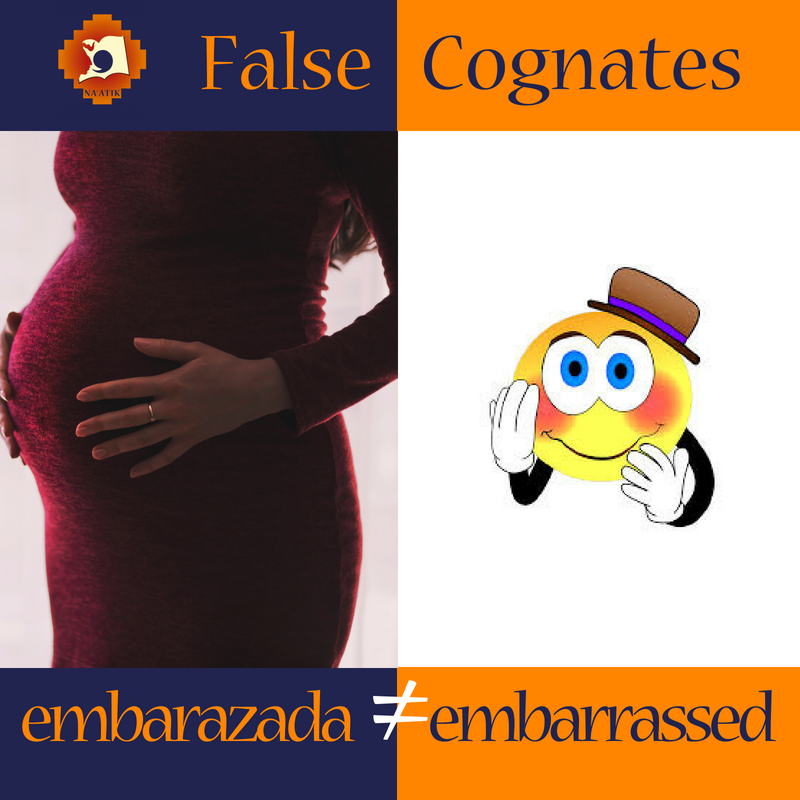6 Spanish Words That Look Like English Words but Mean Something Completely Different
Spanish is one of the easiest foreign languages for English speakers to learn due to the fact that thousands of words are similar. However, this can cause confusion when you run into what are called ‘false cognates’. These look like English words but actually mean something else entirely. Here are some false cognates to learn before misunderstandings occur!
False cognate verbs/verbos:
Introducir ≠ Introduce
Do not use introducir to introduce yourself to your new Mexican host family. This Spanish verb may sound like the English verb ‘to introduce’ but actually means ‘to insert’. The correct verb to introduce yourself or someone else is presentar.
Pablo introduce la llave en la cerradura.
Pablo inserts the key into the lock.
Mi mamá me presentó a su nueva jefa.
My mom introduced me to her new boss.
Chocar ≠ choke
Chocar Although similar sounding, chocar means ‘to crash’ or ‘to collide’, and not ‘to choke’. The correct verb in Spanish, if you’re referring to someone choking on their food, is ahogarse. And if you’re talking about someone choking another person then use estrangular.
El carro chocó con el árbol.
The car crashed into the tree.
El mesero ayudó a la mujer que se estaba ahogando con su comida.
The waiter helped the woman who was choking on her food.
False Cognate Nouns/ Sustantivos:
Sopa ≠ Soap
Sopa
Sopa is for eating not for washing. Although it sounds like ‘soap’ with an ‘a’, sopa could be a kind of cold pasta salad or soup with rice or bits of tortilla in it. Jabón is the Spanish word for ‘soap’.
Me gusta la sopa de pollo.
I like chicken and rice soup.
Este jabón es bueno para la piel seca.
This soap is good for dry skin.
Éxito ≠ exit
Éxito
If you are looking for the exit sign in Mexico, you will not see éxito lit up in green. That’s because éxito means ‘success’ in Spanish. The word for ‘exit’ is in fact, salida.
¿Dónde está la salida?
Where’s the exit?
¿Qué significa el éxito para tí?
What does success mean to you?
False Cognate Adjectives/Adjetivos:
Embarazada ≠ embarrassed
Embarazada
Feeling embarrassed and want to express this to your new Mexican friends? Be careful! This word may sound like ‘embarrassed’, but it actually means ‘pregnant’. There are various ways to say ‘I’m embarrassed’, depending on where you are, but here in Mexico we say tengo vergüenza.
Largo ≠ large
Largo
It may look almost identical, but largo is not the same as ‘large’. Grande means large and largo is the Spanish word for ‘long’. Talking about sizes, you’ll be pleased to know that ‘enorme’ does mean the same as its English counterpart ‘enormous’.
Keep an eye out for more tips on how to not embarazar, whoops we mean avergonzar yourself by being caught out by false cognates!
If you would like to read more about Mexican culture, history, cuisine and language, check out our blog page for our latest monthly articles. You can also sign up to our newsletter to receive these straight to your inbox along with the latest news about our non-profit school for local and Indigenous students in Felipe Carrillo Puerto.
The best way to experience the Mexican lifestyle is in person, with a Na’atik Immersion experience. Not only do you live with a local Mexican-Maya family, sharing home-cooked meals and free time, but also receive expert instruction in your chosen language at our school. Best of all, every immersion experience helps fund our subsidized and free local education program, helping local students to access opportunities and make their own futures.


